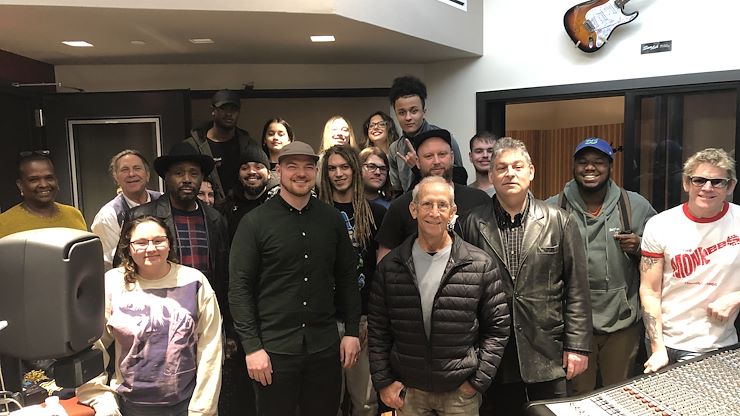
SRT Master Class explores the history of the Philadelphia music scene. Photo by Matthew Moorhead
One of the most valuable resources available to students of Montgomery County Community College is the proximity of the College to historic Philadelphia. However, not many people know about the musical history of the city. On Feb. 19, Philadelphia music historians Max Ochester, Joshua Kwedar and David Louis hosted a Sound Recording & Music Technology (SRT) Master Class to educate students about “The Sound of Philadelphia Soul.”
According to Kwedar, in 1965 Barbara Mason’s “Yes, I’m Ready,” became the first crossover hit released from a Philadelphia studio. Her soul music sound connected with mainstream listeners and led the single to reach #2 on the Billboard R&B charts. As the fifth record released by Philadelphia’s Arctic Records, “Yes, I’m Ready” was arguably the earliest record of Philadelphia Sound.
When Kwedar played “Yes, I’m Ready” for the audience, he noted that the “Philadelphia Sound” is characterized by the use of string instruments in the accompaniment and falsetto voices in the lead and back-up vocals. Louis explained that, like Motown Records in Detroit, recording studios around the country developed unique sounds, though Philadelphia is sometimes overlooked.
“It used to be obvious that songs were recorded in different cities and that songs represented those cities, because equipment wasn’t universal,” he said. “That’s why we host this presentation; to preserve the knowledge of the Philly industry and the Philly sound."
The experts continued their presentation by exploring important locations in the Philadelphia music scene. Theaters, such as the Uptown on North Broad Street, were staples of the community and hosted legendary performers such as Marvin Gaye and The Supremes. Philadelphia’s studios produced some of the most famous pieces of American musical history. Chubby Checker recorded “The Twist” at Philadelphia’s Cameo-Parkway Records, and musical television show American Bandstand was filmed at Philadelphia’s WFIL television studio from 1950-1964.
Ochester, Kwedar and Louis try to preserve the history of Philadelphia Soul Music by sharing their presentation with audiences like the students at MCCC. Likewise, SRT student Vince Thomas wants to learn how the next generation of music creators can help their mission.
“I’m really interested in preserving and working with the Philadelphia Sound,” Thomas said. “I feel like there is a disconnection between the generations of artists, and if we were more aware of the musical history, we could make better music.”
Ochester encouraged the audience to listen to open their minds to as much knowledge as possible, including listening to music outside of their comfort zone, researching and reading books about Philadelphia music artists. Thomas hopes to take this advice with him as he continues his career.
“I want to meet Philadelphia artists and sample music from old Philadelphia records. I want to do everything I can to bridge that gap, whether it’s recreating the sounds or building something completely new,” he said.
Hosted by the Sound Recording and Music Technology Program, Master Classes are free and provide MCCC students and community members with the opportunity to meet with and learn from professionals in the music industry.
